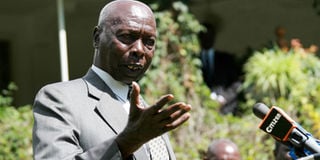Court declines to strike out Moi's appeal in land dispute

Former President the late Daniel arap Moi.
What you need to know:
- The family of ex-chief Noah Chelugui argued that the appeal does not raise any constitutional matters that requires Supreme Court’s interpretation.
- Supreme Court bench led by CJ Martha Koome rejected the application and stated that they explained their reasons for allowing the second appeal in the decision made in October last year.
The Supreme Court has dismissed an application by an Eldoret family seeking to reverse its earlier decision allowing the estate of former President Daniel arap Moi and billionaire businessman Jaswant Rai to pursue a Sh1 billion compensation dispute to the apex court.
The family of ex-chief Noah Chelugui, who successfully sued Moi’s estate and Mr Rai for grabbing their land in 1983 had argued that the appeal does not raise any constitutional matters that requires Supreme Court’s interpretation.
However, a bench of the Supreme Court led by Chief Justice Martha Koome rejected the application and stated that they explained their reasons for allowing the second appeal in the decision made in October last year.
“We find that the issue as to whether the Court has jurisdiction under Article 163(4)(a) was conclusively determined in the Ruling aforesaid ruling,” the court said.
According to the court, the appeal by Moi’s estate and Mr Rai raises issues involving the interpretation or application of the constitution, hence they have the jurisdiction to hear the matter.
Mr Chelugui’s widow Susan and son David sued Mr Moi, Rai Plywood and land officials in Eldoret, arguing the land was forcibly taken from the ex-chief, who died in 2005, on September 21, 1983.
Through senior counsel Ahmednasir Abdullahi, the late Chelugui’s family said of the five issues identified by the Court of Appeal for determination, the only constitutional issue is on retrospective application of the constitution, and which was only addressed from a theoretical perspective and did not form the basis of the judgment.
In an affidavit, Mr Rai said the appeal involves the interpretation of several Articles of the constitution, particularly the application of the Limitation of Actions Act to the enforcement of fundamental rights and freedoms.
The tycoon said the question of retrospective application of the constitution was raised before the trial court but the judge who heard the case did not make a determination on the issue.
Moi died on February 4, 2020 and his estate has been dogged by several cases brought against the former head of state.
The family of the ex-chief sued both Moi and Mr Rai for gabbing their 53-acre parcel of land in Eldoret.
Mr Rai defended himself saying he purchased the land from Mr Moi in 2007 after doing a search and confirming that it belonged to the former President.
Mr Moi’s family had faulted Justice Ombwayo’s decision saying he was wrong in using the 2010 Constitution to determine the suit instead of the set of laws in place at the time.
But the Court of Appeal ruled that Article 40 of the Constitution, which provides for the right to protection of property, can be applied retrospectively and hence can be used to determine disputes that arose before the promulgation of the 2010 laws.
“With guidance from the above provision on the manner in which the Constitution should be construed, we think that Article 40 of the Constitution is one of those constitutional provisions that is not limited in its application. It can, and must in appropriate cases, apply retrospectively,” the judges of the Appellate court said.





